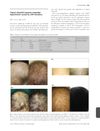 69 citations,
January 2013 in “Frontiers in Immunology”
69 citations,
January 2013 in “Frontiers in Immunology” The FOXN1 gene is crucial for developing immune cells and preventing immune disorders.
 November 2020 in “International journal of contemporary pediatrics”
November 2020 in “International journal of contemporary pediatrics” Two siblings had a rare immune disorder caused by a FOXN1 gene mutation.
 53 citations,
August 2019 in “American journal of human genetics”
53 citations,
August 2019 in “American journal of human genetics” FOXN1 gene variants cause low T cells and immune issues from birth.
 17 citations,
June 2019 in “The journal of immunology/The Journal of immunology”
17 citations,
June 2019 in “The journal of immunology/The Journal of immunology” A specific DNA region is crucial for Foxn1 gene expression in thymus cells but not in hair follicles.
 6 citations,
August 2022 in “Science immunology”
6 citations,
August 2022 in “Science immunology” Foxn1 gene regulation is crucial for thymus development but not for hair growth.
 32 citations,
May 2012 in “PloS one”
32 citations,
May 2012 in “PloS one” Thymic transplantation normalized some T-cells but not others, maintaining immune function.
 16 citations,
October 2014 in “Cell death and disease”
16 citations,
October 2014 in “Cell death and disease” FoxN1 overexpression in young mice harms immune cell and skin development.
 103 citations,
January 2011 in “Blood”
103 citations,
January 2011 in “Blood” Thymus transplantation successfully restored immune function in infants with FOXN1 deficiency.
11 citations,
August 2019 in “PubMed” Hirsutism in women is mostly caused by polycystic ovary syndrome and idiopathic hyperandrogenism.
7 citations,
May 2014 in “Iranian Red Crescent medical journal” Laser hair removal is effective for hirsutism when combined with treatment for the underlying causes.
 November 1966 in “British Journal of Dermatology”
November 1966 in “British Journal of Dermatology” The meeting discussed various skin conditions, treatments, and unusual cases, highlighting the effectiveness of tetracycline in treating rosacea.
 32 citations,
April 1994 in “Journal of the American Academy of Dermatology”
32 citations,
April 1994 in “Journal of the American Academy of Dermatology” High androgen levels and genetic factors likely cause Becker's nevus and related symptoms.
 March 1987 in “Journal of The American Academy of Dermatology”
March 1987 in “Journal of The American Academy of Dermatology” Oral spironolactone and isotretinoin are effective for treating acne.
 10 citations,
March 2019 in “Human Genetics”
10 citations,
March 2019 in “Human Genetics” A genetic mutation in the SGK3 gene causes hairlessness in Scottish Deerhounds and may relate to human hair loss.
 November 2014 in “Elsevier eBooks”
November 2014 in “Elsevier eBooks” Gene mutations can cause problems in male genital development.
 1 citations,
November 1996 in “Journal of Cutaneous Medicine and Surgery”
1 citations,
November 1996 in “Journal of Cutaneous Medicine and Surgery” Hormones, especially androgens, play a key role in causing acne, and treatments like hormone control pills and hormone-blocking medications can help.
 July 2024 in “Journal of Dermatological Treatment”
July 2024 in “Journal of Dermatological Treatment” Botanical extracts and Minoxidil improved hair condition in a boy with a genetic disorder.
 1 citations,
October 2010 in “Cambridge University Press eBooks”
1 citations,
October 2010 in “Cambridge University Press eBooks” Hormonal therapies are effective for managing hair and skin symptoms in women with PCOS.
 July 2024 in “Dermatology Practical & Conceptual”
July 2024 in “Dermatology Practical & Conceptual” LC-OCT helps accurately diagnose different types of infant hair loss without invasive methods.
 45 citations,
January 2006 in “Endocrine journal”
45 citations,
January 2006 in “Endocrine journal” To diagnose Polycystic Ovarian Syndrome, two out of three signs—irregular periods, high male hormone levels, or cysts on the ovaries—are needed.
 7 citations,
March 2015 in “British Journal of Dermatology”
7 citations,
March 2015 in “British Journal of Dermatology” Applying minoxidil can help improve hair growth in people with hair loss caused by LIPH gene mutations.
January 2021 in “Voprosy ginekologii akušerstva i perinatologii” Effective management of hyperandrogenism in young women requires accurate diagnosis and tailored treatment.
 57 citations,
March 2011 in “Pediatric Dermatology”
57 citations,
March 2011 in “Pediatric Dermatology” Nearly half of children with primary immunodeficiency disorders showed skin problems, often as the first sign of their condition.
 53 citations,
October 1993 in “Drug Safety”
53 citations,
October 1993 in “Drug Safety” Oral retinoids can cause side effects ranging from mild to severe, including birth defects, and require careful monitoring and contraception.
 September 2011 in “American Journal of Clinical Dermatology”
September 2011 in “American Journal of Clinical Dermatology” The birth control pill containing ethinylestradiol and chlormadinone may help treat acne and other skin and hair conditions related to hormones.
 88 citations,
April 2017 in “Journal of Pediatric and Adolescent Gynecology”
88 citations,
April 2017 in “Journal of Pediatric and Adolescent Gynecology” The document concludes that early diagnosis and treatment of Congenital Adrenal Hyperplasia are crucial for preventing serious health issues and improving patient outcomes.
 22 citations,
August 2011 in “Endocrine Practice”
22 citations,
August 2011 in “Endocrine Practice” Most hirsutism cases are due to PCOS, and treatment focuses on lowering testosterone and blocking its effects.
 2 citations,
January 2013 in “Elsevier eBooks”
2 citations,
January 2013 in “Elsevier eBooks” The chapter explains the causes of excessive hair growth and masculinization in women and how to measure hormone levels related to these conditions.
5 citations,
October 2017 in “JOGC/Journal of obstetrics and gynaecology Canada” The conclusion is that proper diagnosis and long-term treatment, including medication, hair removal, and lifestyle changes, are important for improving hirsutism, especially in PCOS patients.
 86 citations,
March 1993 in “Toxicology and Applied Pharmacology”
86 citations,
March 1993 in “Toxicology and Applied Pharmacology” Finasteride affects male rat genitalia development, causing abnormalities during specific pregnancy days.


























